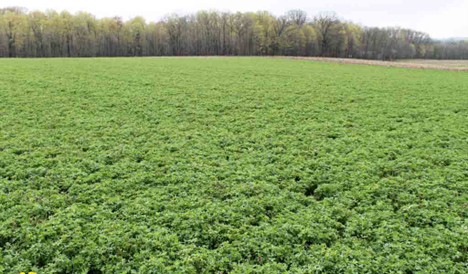 Image source: Farm and Dairy file photo (https://www.farmanddairy.com/columns/weed-management-in-seedling-alfalfa/609671.html)
Image source: Farm and Dairy file photo (https://www.farmanddairy.com/columns/weed-management-in-seedling-alfalfa/609671.html)
- Weed infestations can reduce the yield, quality, and longevity of alfalfa stands.
- The most effective weed management programs begin with production practices that encourage a healthy alfalfa stand.
- Weed control in the first dormant period after seeding is critical for stand establishment.
- Perennial weeds should be intensively managed beginning one or two years before alfalfa establishment.
Weed infestations can reduce the yield, quality, and longevity of alfalfa stands. Low soil pH and fertility, poorly timed insect control, and poorly timed cutting and harvest can result in reduced growth of alfalfa. These poor management tactics leading to bare areas and thin alfalfa stands which can be invaded by weed infestations.
The most effective weed management programs begin with production practices that encourage a healthy alfalfa stand. Soil pH adjustments, attention to soil fertility levels, insect management, and timely cutting and harvest can reduce the competition and spread of many weeds in alfalfa.
Weed control in the first year, and in particular, the first dormant period after seeding is critical for stand establishment. Winter annuals are most likely to invade in the fall or early spring during periods of alfalfa dormancy. Winter annual weeds such as henbit, purple deadnettle, chickweed, and brome grasses are first noticed as a problem in the spring just before the first harvest. If you know the field has winter annual weeds and want to get a head start on control measures, Eptam™ herbicide can be used pre plant incorporated before seeding to suppress winter annual weeds. Herbicides and their efficacy on winter annual weeds after alfalfa has emerged are shown on page 5-2 of the FS Crop Protection Handbook. There are several herbicides that control multiple winter annual weed species. Some herbicides such as Extreme™ and glyphosate are only labeled for use on alfalfa that is Roundup Ready™. Metribuzin can only be used on dormant alfalfa. It is also important to keep in mind that some herbicides cannot be used on alfalfa stands that are less than one year old period, so be sure to consult the herbicide label and the write ups for each herbicide starting on page 5-5 of the FS Crop Protection Handbook to ensure proper application timing and pre harvest interval is followed with the herbicide chosen.
Summer annuals are typically first noticed after the first cutting as the alfalfa and weeds are starting to regrow. Herbicides that can be used on summer annual weeds are shown on page 5-3 of the FS Crop Protection Handbook. As mentioned above, some herbicides cannot be used in alfalfa if the stand is less than a year old.
Perennial weed management in alfalfa should begin well in advance of seeding. Perennial weeds such as bindweed, Canada thistle, curly dock, dandelion, johnsongrass, hemp dogbane, quackgrass, and others are a primary concern since management options for controlling them in seedling and established alfalfa are limited. Most herbicides applied during alfalfa production do not effectively control the root systems of perennial weeds. Notable exceptions would be the use of Extreme™ or glyphosate in Roundup Ready™ alfalfa or the use of Poast™ or Select™ on perennial grasses in any kind of alfalfa. For this reason, perennial weeds should be intensively managed beginning one or two years before alfalfa establishment. Perennial weed patches in non Roundup Ready alfalfa can be effectively managed in-season with spot treatments of glyphosate, but only by sacrificing the alfalfa stand in those areas if the alfalfa is not Roundup Ready. Reseeding alfalfa in those open areas is limited to first year seedling stands only due to chemicals produced in older alfalfa plants that inhibit the germination and growth of alfalfa seedlings. A potential consequence of spot treating with herbicides is leaving open areas for other weeds to grow and reproduce throughout the life of the stand. For questions regarding herbicides for alfalfa in your operation, reach out to your local FS Crop Specialist.